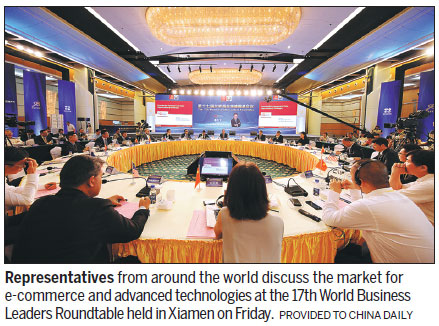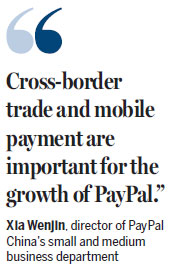

The development trajectory of cross-border e-commerce and blockchain technology were placed firmly in the spotlight at the 17th World Business Leaders Roundtable, held on Friday in Xiamen, Fujian province.
Senior executives from renowned Chinese e-commerce enterprises, experts in blockchain and representatives from regions involved in the Belt and Road Initiative gathered at the high-level event to discuss the current market for these technologies, experiences in development so far and the prospects for the future.
Jeff Astle, managing director of China-Britain Business Council's China operations, said that China has become the largest retail market worldwide with 800 million internet users. With the rapid development of e-commerce, British enterprises have greater opportunities to enter the Chinese market.

In doing so, they should pay attention to import regulations, intellectual property and payment integration issues in China, Astle added.
Kang Ping, director of supplier management at Chinese multinational Alibaba, said that small and medium-size companies are playing a more important role in the market, but they are encountering more challenges, such as high rents, complicated supply chains and changing economic conditions.
The Belt and Road countries continues to provide opportunities for cross-border e-commerce and companies should try their best to enhance their competitiveness in order to seize upon them, according to Kang.
Wang Chaobo, founder and CEO of Shenzhen Block Code Technology Service, host of the conference, said that the unique advantages of blockchain technology are widely recognized and will play an important role in the development of cross-board e-commerce.
His company is exploring blockchain technology in e-commerce, finance, energy and environmental protection.
Xia Wenjin, director of Pay-Pal China's small and medium business department, said "Cross-border trade and mobile payment are important for the growth of PayPal". Cross-border trade accounted for 21 percent of the online payment company's total trade volume globally last year, according to PayPal.

In the second quarter of this year, 39 percent of all payments made with PayPal were made using mobile phones.
PayPal will support Chinese users' entry into the global e-commerce market and expects to have a 40 percent share in China's global e-commerce market by 2021, the company said.
A matching event held after the conference was attended by e-commerce platforms including Amazon, eBay, PayPal and Alibaba as well as emerging e-commerce platforms from Africa and Latin America.
More than 300 people attended the event and 60 companies made informal agreements to cooperate in the future.
Yan Zhiping, acting chairman of the China Council for the Promotion of International Trade Xiamen Committee, said the conference, as an important event running up to the 20th China International Fair for Investment and Trade, will continue to promote commerce and investment among China and regions and countries involved with the BRI.
caoyingying@chinadaily.com.cn
World-class economic, trade show
The China International Fair for Investment and Trade has developed into a globally influential event.
When Fujian entered the eighth year of implementing the reform and opening-up policy in 1987 and on Sept 8 of that year, cities of Xiamen, Quanzhou, Zhangzhou and Longyan organized an investment fair in Xiamen for foreign businesspeople. The event was the beginning of today's CIFIT.
It was upgraded to a national fair for investment and trade in 1997 by the then-Ministry of Foreign Trade and Economic Cooperation. The event became an authoritative platform for China to attract foreign investment and began to soar from that point.
The fair separated investment and trade in 2000 and hosted the international investment forum for the first time that year. The fifth fair in 2001 held 30 investment seminars and introduction conferences for attendees - especially Chinese companies - as a convenient way to learn about the overseas investment environment.
The World Association of Investment Promotion Agencies, first co-organizer of the fair, participated in the event's organization and promotion in 2002. The United Nations Conference on Trade and Development, the United Nations Industrial Development Organization, the International Finance Corp and the Organization for Economic Cooperation and Development also became the fair's co-organizers. Approved by the State Council in 2005, the event was officially renamed the China International Fair for Investment and Trade. In that year, 125 countries and regions sent representatives to attend the event.
CIFIT celebrated its 10th anniversary in 2006. By identifying business growth opportunities for Chinese companies and helping businesses in different countries and regions to grow in China, it became an internationally renowned brand. The organizing committee of the fair has also been upgraded. The Fujian provincial government, the Xiamen city government and the investment promotion agency at the Ministry of Commerce, organizers of the fair, have played bigger roles in the event's planning, organization and service.